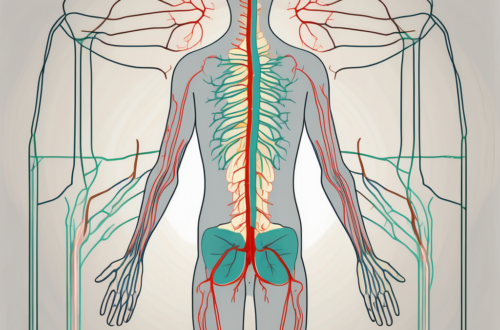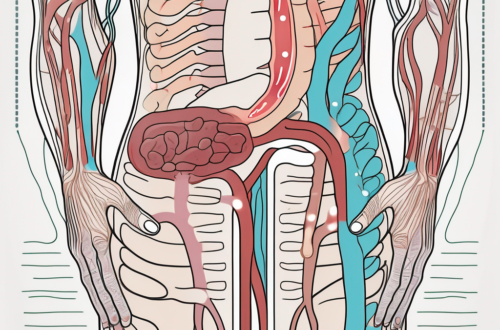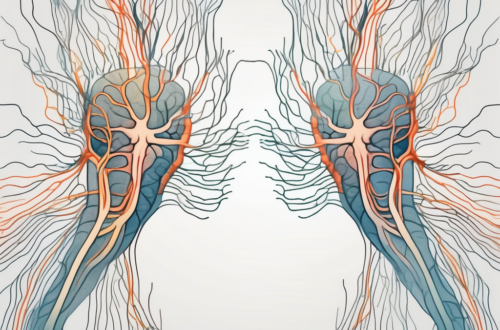Parasympathetic nerve disorders are complex conditions that can significantly impact a person’s quality of life. It is imperative to gain a comprehensive understanding of these disorders to effectively manage their symptoms and seek appropriate treatment. In this article, we will explore the basics of parasympathetic nerve disorders, their causes, symptoms, diagnostic procedures, treatment options, and ways to live with these conditions.
The Basics of Parasympathetic Nerve Disorders
Defining Parasympathetic Nerve Disorders
Parasympathetic nerve disorders are a group of conditions that affect the parasympathetic nervous system, which is responsible for regulating various bodily functions such as digestion, excretion, and heart rate. When this system malfunctions, it can lead to a range of symptoms and complications.
Parasympathetic nerve disorders can arise from various causes, including genetic factors, autoimmune diseases, infections, and trauma. These disorders can affect people of all ages, from infants to the elderly. While some parasympathetic nerve disorders are relatively mild and easily manageable, others can be severe and significantly impact a person’s quality of life.
One common parasympathetic nerve disorder is known as dysautonomia. This condition occurs when the autonomic nervous system, which includes the parasympathetic and sympathetic systems, does not function properly. Dysautonomia can manifest in different ways, with symptoms ranging from dizziness and fainting to gastrointestinal issues and difficulty regulating body temperature.
The Role of the Parasympathetic Nervous System
The parasympathetic nervous system works in harmony with the sympathetic nervous system to maintain homeostasis in the body. While the sympathetic system primes the body for action, the parasympathetic system helps restore calm by conserving energy and promoting rest and digestion. These two systems work together to maintain a delicate balance.
When the parasympathetic nervous system is functioning properly, it helps regulate heart rate, pupil constriction, salivation, digestion, and bladder function, among other vital processes. It ensures that our bodies can rest and recover after periods of stress or activity.
However, when the parasympathetic nervous system is disrupted, it can lead to a variety of symptoms. For example, a malfunctioning parasympathetic system may cause excessive sweating, dry mouth, constipation, or difficulty emptying the bladder. These symptoms can significantly impact a person’s daily life and overall well-being.
Parasympathetic nerve disorders can also affect the cardiovascular system. When the parasympathetic system is not functioning properly, it can lead to irregular heart rhythms, low blood pressure, and decreased blood flow to vital organs. These cardiovascular complications can be life-threatening and require immediate medical attention.
Furthermore, the parasympathetic nervous system plays a crucial role in the digestive process. It stimulates the production of digestive enzymes, increases blood flow to the digestive organs, and promotes the contraction of smooth muscles in the gastrointestinal tract. When the parasympathetic system is impaired, it can lead to digestive issues such as bloating, abdominal pain, and difficulty absorbing nutrients.
In conclusion, the parasympathetic nervous system is an essential component of our overall health and well-being. When it malfunctions, it can result in a range of symptoms and complications that can significantly impact our daily lives. Understanding the basics of parasympathetic nerve disorders is crucial for early detection, proper diagnosis, and effective management of these conditions.
Causes of Parasympathetic Nerve Disorders
Parasympathetic nerve disorders can arise from a variety of causes, ranging from genetic factors to environmental triggers and underlying health conditions. Understanding the factors that contribute to the development of these disorders is crucial in order to provide appropriate care and management.
Genetic Factors
Some parasympathetic nerve disorders have a genetic component, meaning they are inherited from one or both parents. Through scientific advancements, researchers have identified specific gene mutations that contribute to the development of these conditions. Genetic counseling can provide valuable insights for individuals and families who may be at risk.
Genetic factors play a significant role in the pathogenesis of parasympathetic nerve disorders. These disorders can be inherited in an autosomal dominant, autosomal recessive, or X-linked manner, depending on the specific gene involved. Researchers have identified several genes that are associated with parasympathetic nerve disorders, including ABCA1, LRP5, and PSEN1. These genes are involved in various cellular processes, such as lipid metabolism, synaptic function, and amyloid processing.
Understanding the genetic basis of parasympathetic nerve disorders is essential for accurate diagnosis and personalized treatment. Genetic testing can help identify specific gene mutations and guide treatment decisions. Additionally, genetic counseling can provide individuals and families with information about the inheritance pattern, recurrence risks, and available support resources.
Environmental Triggers
Environmental factors, such as exposure to toxins or certain infections, may trigger parasympathetic nerve disorders in susceptible individuals. More research is needed to establish a definitive link between these environmental triggers and the development of these disorders. If you suspect an environmental factor may be contributing to your symptoms, consult with a healthcare professional.
Environmental triggers can have a profound impact on the development and progression of parasympathetic nerve disorders. Toxins, such as heavy metals, pesticides, and industrial chemicals, can disrupt the normal functioning of the parasympathetic nervous system. Exposure to these toxins can occur through various routes, including inhalation, ingestion, or skin contact.
Infections, particularly viral and bacterial infections, have also been implicated in the onset of parasympathetic nerve disorders. Certain pathogens have the ability to directly infect and damage the parasympathetic neurons, leading to dysfunction of the nervous system. Additionally, the immune response triggered by these infections can further contribute to nerve damage.
Identifying and avoiding potential environmental triggers is an important aspect of managing parasympathetic nerve disorders. This may involve lifestyle modifications, such as reducing exposure to toxins, practicing good hygiene, and taking appropriate precautions in high-risk environments.
Underlying Health Conditions
Various underlying health conditions can disrupt the normal functioning of the parasympathetic nervous system. Autoimmune disorders, metabolic diseases, and certain neurological conditions have been associated with parasympathetic nerve disorders. It is crucial to work closely with your healthcare provider to identify and manage any underlying conditions contributing to your symptoms.
Autoimmune disorders, such as multiple sclerosis and Guillain-Barré syndrome, can result in immune-mediated damage to the parasympathetic nerves. In these conditions, the immune system mistakenly attacks the body’s own tissues, including the nerves, leading to dysfunction of the parasympathetic nervous system.
Metabolic diseases, such as diabetes mellitus and hypothyroidism, can also affect the parasympathetic nervous system. Abnormal glucose metabolism and hormonal imbalances can disrupt the normal functioning of the nerves, leading to symptoms associated with parasympathetic nerve disorders.
Certain neurological conditions, such as Parkinson’s disease and Alzheimer’s disease, have been linked to parasympathetic nerve dysfunction. These neurodegenerative disorders involve the progressive degeneration of neurons, including those in the parasympathetic nervous system.
Managing underlying health conditions is crucial in the management of parasympathetic nerve disorders. This may involve a multidisciplinary approach, including medication, lifestyle modifications, and supportive therapies. Regular monitoring and follow-up with healthcare professionals are essential to ensure optimal management of both the underlying condition and the associated parasympathetic nerve disorder.
Identifying Symptoms of Parasympathetic Nerve Disorders
Parasympathetic nerve disorders can manifest with a wide range of physical and psychological symptoms. Understanding these symptoms is crucial for early detection and effective management of the condition.
Physical Symptoms
When it comes to parasympathetic nerve disorders, physical symptoms can be diverse and affect various bodily functions. One common physical symptom is gastrointestinal issues. Individuals may experience bouts of constipation or diarrhea, which can significantly impact their daily lives. These digestive problems can cause discomfort and disrupt normal bowel movements.
Bladder and urinary problems are also prevalent in individuals with parasympathetic nerve disorders. Some may experience difficulties in controlling their bladder, leading to frequent urination or involuntary leakage. These issues can be embarrassing and affect an individual’s quality of life.
Another physical symptom is the fluctuation in heart rate. Individuals may notice that their heart rate decreases or increases unexpectedly. This irregularity can be concerning and may require medical attention to ensure cardiovascular health.
Abnormal sweating is another common physical symptom of parasympathetic nerve disorders. Individuals may experience excessive sweating, even in situations where it is not warranted. This can cause social discomfort and affect an individual’s self-confidence.
Difficulty swallowing, known as dysphagia, is also associated with parasympathetic nerve disorders. This can make it challenging to eat and drink, leading to weight loss and nutritional deficiencies if not addressed promptly.
It is important to note that these physical symptoms can vary in severity and may fluctuate over time. Regular monitoring and communication with healthcare professionals are essential for proper management.
Emotional and Psychological Symptoms
Parasympathetic nerve disorders not only affect physical health but can also have a significant impact on an individual’s emotional and psychological well-being. It is crucial to recognize and address these symptoms to ensure comprehensive care.
Anxiety is a common emotional symptom experienced by individuals with parasympathetic nerve disorders. The constant worry and fear can be overwhelming and interfere with daily functioning. Seeking support from mental health professionals can help individuals develop coping strategies and manage anxiety effectively.
Depression is another psychological symptom that individuals with parasympathetic nerve disorders may experience. The persistent feelings of sadness, hopelessness, and loss of interest in activities can greatly affect one’s quality of life. It is important to seek professional help to address depression and prevent it from worsening.
Mood swings are also prevalent among those with parasympathetic nerve disorders. Individuals may experience sudden and intense shifts in their emotions, making it challenging to regulate and maintain stable moods. Developing healthy coping mechanisms and seeking therapy can assist in managing mood swings effectively.
Cognitive difficulties, such as problems with memory, concentration, and decision-making, can also be associated with parasympathetic nerve disorders. These cognitive impairments can impact an individual’s ability to perform daily tasks and affect their overall productivity. Working with healthcare professionals and implementing cognitive strategies can help mitigate these difficulties.
It is important to seek support from mental health professionals to manage these aspects of your condition effectively. They can provide guidance, therapy, and support to help individuals navigate the emotional and psychological challenges that come with parasympathetic nerve disorders.
Diagnostic Procedures for Parasympathetic Nerve Disorders
Medical History and Physical Examination
When diagnosing parasympathetic nerve disorders, healthcare providers typically begin by taking a detailed medical history and conducting a thorough physical examination. These steps help identify potential underlying causes and contribute to a comprehensive assessment of the symptoms.
During the medical history, the healthcare provider will ask the patient about their symptoms, including any changes in bodily functions such as digestion, urination, and sexual function. They will also inquire about any recent injuries or illnesses that may have triggered the onset of symptoms. Additionally, the healthcare provider will ask about the patient’s lifestyle, including their diet, exercise routine, and stress levels, as these factors can influence the functioning of the parasympathetic nervous system.
The physical examination may involve assessing the patient’s vital signs, such as heart rate, blood pressure, and respiratory rate. The healthcare provider may also examine the patient’s eyes, ears, nose, and throat, as well as perform a neurological examination to evaluate the function of the cranial nerves. Furthermore, they may palpate the abdomen to check for any abnormalities in the gastrointestinal tract, which can be indicative of parasympathetic nerve disorders.
Laboratory Tests and Imaging
Laboratory tests, such as blood work and urine analysis, can provide valuable insights into a person’s overall health and help rule out other conditions. In the case of parasympathetic nerve disorders, specific blood tests may be ordered to measure the levels of certain neurotransmitters or hormones that are involved in the regulation of the parasympathetic nervous system.
In some cases, additional imaging studies, such as magnetic resonance imaging (MRI) or computed tomography (CT) scans, may be ordered to assess the integrity of the nervous system. These imaging techniques can help identify any structural abnormalities or lesions that may be affecting the parasympathetic nerves. Additionally, specialized imaging techniques, such as functional MRI or positron emission tomography (PET) scans, may be used to evaluate the activity and connectivity of the brain regions involved in parasympathetic regulation.
Neurological Evaluation
Neurological evaluations are crucial for diagnosing and assessing parasympathetic nerve disorders. These evaluations may involve specialized tests such as nerve conduction studies, autonomic function tests, and skin biopsies.
Nerve conduction studies measure the speed and strength of electrical signals as they travel along the nerves. By assessing the conduction velocity and amplitude of these signals, healthcare providers can determine if there are any abnormalities in the parasympathetic nerve pathways.
Autonomic function tests assess the function of the autonomic nervous system, which includes the parasympathetic nerves. These tests may involve measuring heart rate variability, blood pressure responses to changes in posture, and sweating responses to stimuli. Abnormal results in these tests can indicate dysfunction in the parasympathetic nervous system.
Skin biopsies may be performed to evaluate the density of nerve fibers in the skin. A decrease in nerve fiber density can suggest damage or degeneration of the parasympathetic nerves.
Overall, the combination of medical history, physical examination, laboratory tests, and specialized neurological evaluations allows healthcare providers to make an accurate diagnosis of parasympathetic nerve disorders. This comprehensive approach ensures that appropriate treatment strategies can be implemented to manage the symptoms and improve the patient’s quality of life.
Treatment Options for Parasympathetic Nerve Disorders
Medication and Drug Therapies
Medication is often a primary treatment approach for managing parasympathetic nerve disorders. The specific medications prescribed will depend on the type of disorder and the individual’s symptoms. These may include anticholinergic medications to help regulate abnormal nerve signals or pain medications to alleviate discomfort. It is crucial to follow your healthcare provider’s guidance and inform them of any side effects or concerns.
Physical Therapy and Rehabilitation
Physical therapy and rehabilitation can play a significant role in managing parasympathetic nerve disorders. These interventions may focus on improving muscle strength, balance, and coordination. Additionally, techniques such as deep breathing exercises, relaxation training, and biofeedback can help to regulate the autonomic nervous system and minimize symptoms.
Surgical Interventions
In severe cases, surgical interventions may be necessary to alleviate symptoms caused by parasympathetic nerve disorders. These procedures are typically reserved for individuals who do not respond to conservative treatments. Surgical options may include nerve decompression, nerve grafting, or neurectomy. It is important to consult with a healthcare professional to determine if surgery is appropriate for your specific condition.
Living with Parasympathetic Nerve Disorders
Lifestyle Modifications
Incorporating certain lifestyle modifications can help individuals with parasympathetic nerve disorders manage their symptoms effectively. These may include maintaining a well-balanced diet, engaging in regular exercise, getting sufficient rest and sleep, and managing stress through techniques such as meditation or mindfulness. It is essential to consult with a healthcare provider to identify lifestyle changes that are safe and appropriate for your condition.
Support Systems and Mental Health Care
Living with a parasympathetic nerve disorder can be challenging, both physically and emotionally. Building a strong support system is crucial – connecting with family, friends, or support groups can provide valuable emotional support and understanding. Additionally, seeking guidance from mental health professionals can help navigate the psychological impact of these disorders and develop coping strategies.
Prognosis and Future Research
Prognosis for individuals with parasympathetic nerve disorders can vary depending on the specific disorder and its severity. While some individuals may experience significant symptom improvement with treatment and lifestyle modifications, others may require ongoing management. Ongoing research and advancements in medical science continue to shed light on these disorders, offering hope for improved treatment options and outcomes in the future.
In conclusion, understanding parasympathetic nerve disorders involves comprehending their causes, recognizing symptoms, undergoing appropriate diagnostic procedures, exploring treatment options, and embracing lifestyle modifications. If you suspect you may be experiencing symptoms related to a parasympathetic nerve disorder, consult with a healthcare professional to receive an accurate diagnosis and develop an individualized treatment plan. Your journey toward managing and living with these disorders should be supported by evidence-based medical care and a collaborative approach between you and your healthcare provider.





